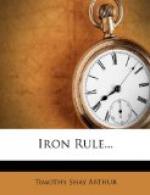Steadily, for a long time, had the young man looked forward to this period; and in order to have the means of effecting a thorough change in his external appearance, and to be able to support himself after his return East, until he obtained some kind of employment, he had left nearly all his pay in the hands of the disbursing officer. It now amounted to nearly two hundred dollars.
It was in Santa Fe that Andrew obtained his discharge from the United States’ service. This was soon after the conclusion of the peace with Mexico, and about the time when the first exciting news came of golden discoveries on the tributaries of the Sacramento.
On the day after Andrew received his discharge, and while making preparations for his journey eastward, a company, in which were several new recruits arrived from the Wachita. Among them he discovered a young man from P—, to whom he put the direct question.
“Do you know a Mr. Howland of your city?”
“Andrew Howland, the merchant?” inquired the young man, who was not over twenty-one years of age.
“Yes,” returned Andrew, in a tone of affected indifference.
“His store is in the same block with my father’s.”
“Indeed! What is your father’s name?”
The young man’s eyes fell to the ground, and his face became overspread with crimson.
“Winters,” he replied, at length recovering himself.
Andrew turned partly away to conceal the sudden emotion this intelligence had created. Mastering his feelings with a vigorous effort, he lifted his eyes to the countenance of the young man and at once recognized in him the brother of Emily. Restraining the eagerness he felt to press many questions, Andrew asked him about his journey from the last military post, and after getting a number of answers to which he scarcely listened, said—
“How long is it since you left P—?”
“About six months,” replied young Winters.
“Do your friends know where you are?”
“No, indeed! Nor would I have them. So, please bear that in mind. I answered your question almost on the spur of the moment.”
“Do you know anything about Mr. Howland or his family?” asked Andrew, without seeming to notice the young man’s remark.
“Nothing very particular; only that the old gentleman failed in business about a year ago.”
“Ah! How came that?”
“His son Edward broke him up.”
“His son Edward?”
“Yes. The old man set him a going in business; but he soon run himself under, and his father into the bargain. He made a terrible bad failure of it.”
“Who?”
“Edward Howland. He went off soon after, and they do say, carried his pockets full of money. And I imagine there is some truth in it. He wasn’t exactly the clear grit. Some people called him a smooth-faced hypocrite, and I guess they were not very far wrong.”




